Leadership, Management, and Decision-Making: Skill Development Report
VerifiedAdded on 2019/12/28
|9
|2470
|136
Report
AI Summary
This report delves into the concepts of leadership, management, and decision-making, examining their practical applications within a team setting. It begins by exploring various leadership styles, including the expert power model, and analyzes their influence on team dynamics and decision-making processes. The report then discusses the importance of strategic decision-making, conflict resolution, and effective communication within a team environment. Furthermore, it reflects on the development of essential skills, such as management, leadership, change management, and ethical decision-making, highlighting the practical application of these skills through real-world examples and theoretical frameworks like French and Raven's theory of power. The report also emphasizes the importance of adaptability, ethical considerations, and self-evaluation in personal and professional growth.
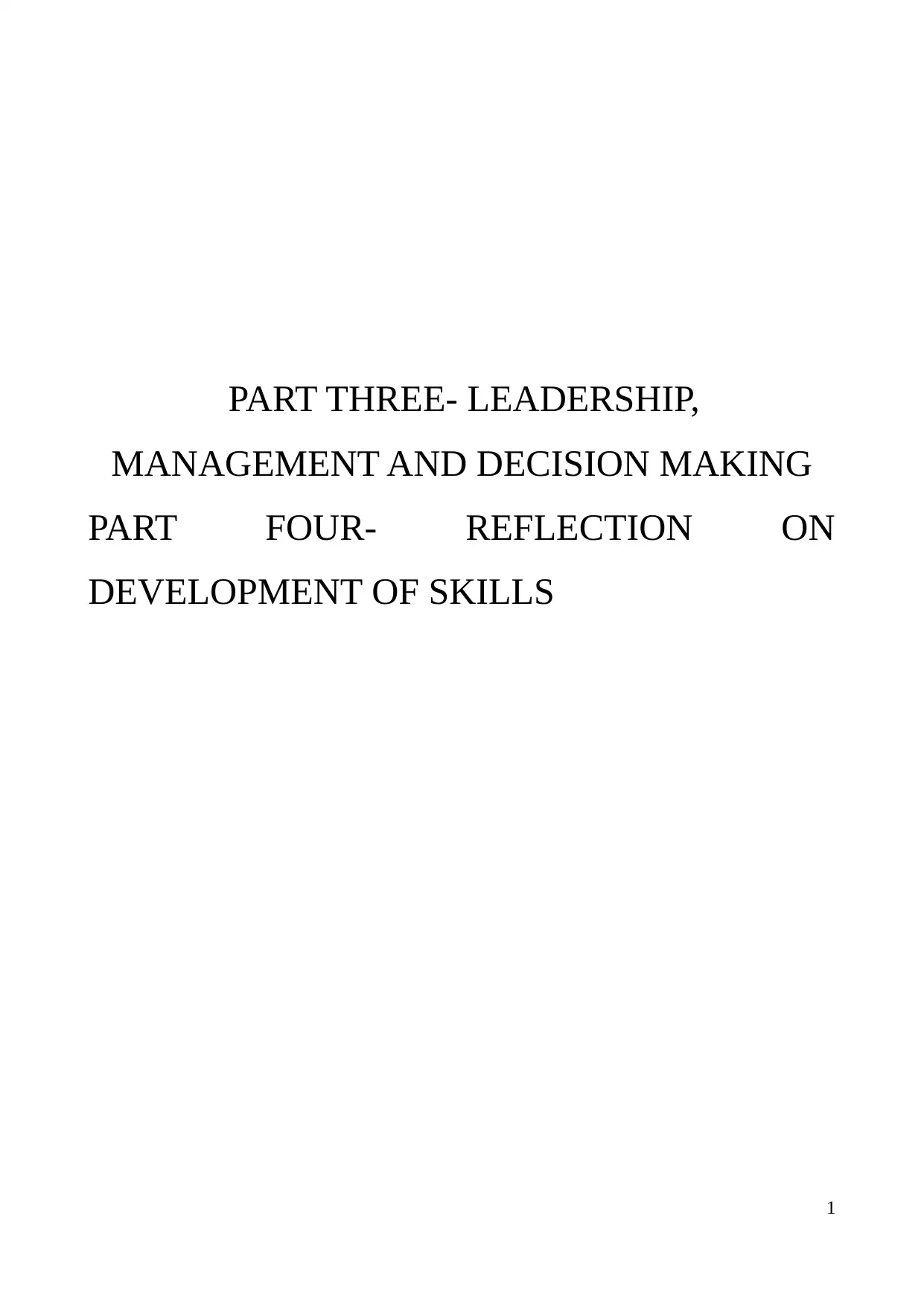
PART THREE- LEADERSHIP,
MANAGEMENT AND DECISION MAKING
PART FOUR- REFLECTION ON
DEVELOPMENT OF SKILLS
1
MANAGEMENT AND DECISION MAKING
PART FOUR- REFLECTION ON
DEVELOPMENT OF SKILLS
1
Paraphrase This Document
Need a fresh take? Get an instant paraphrase of this document with our AI Paraphraser
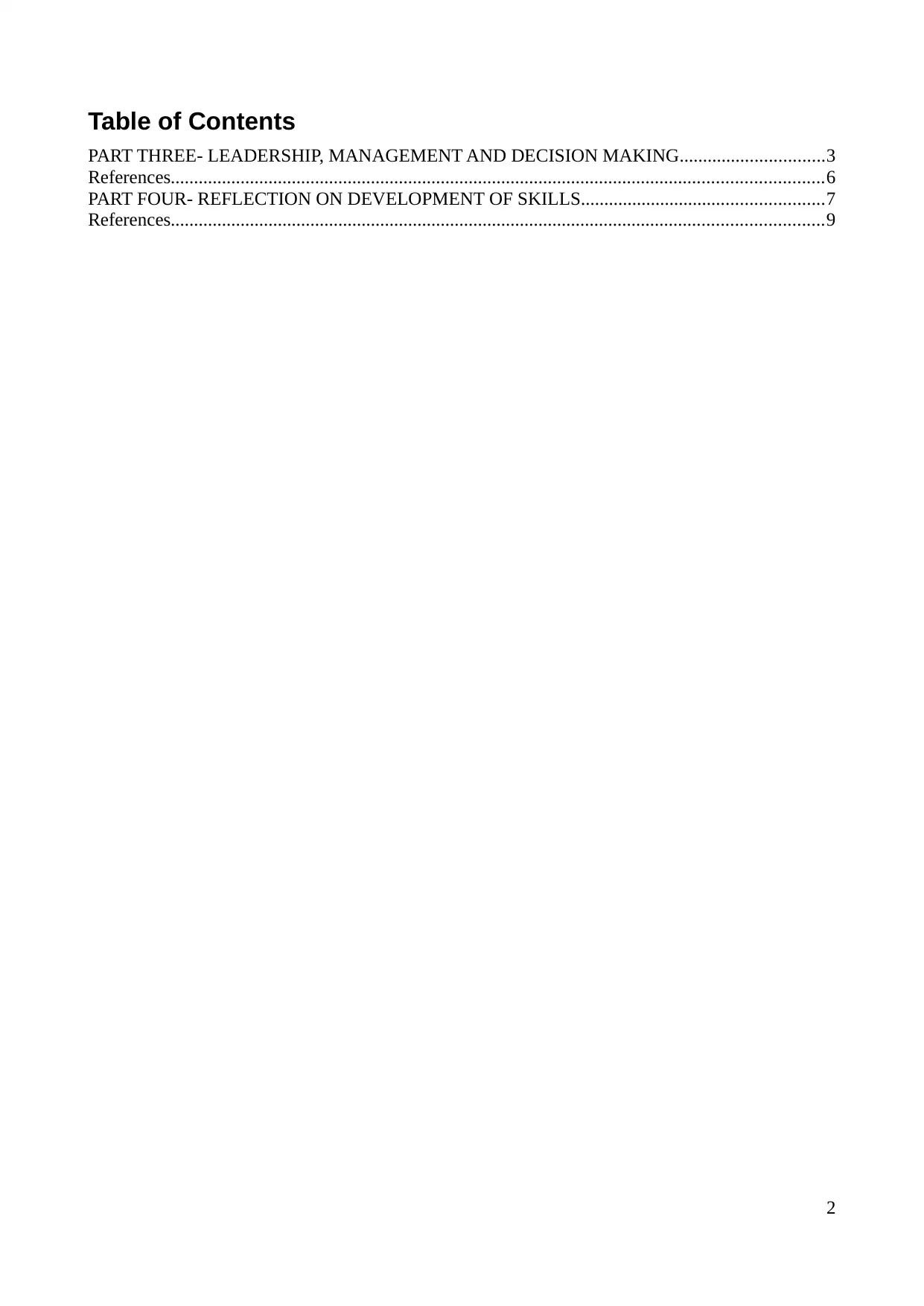
Table of Contents
PART THREE- LEADERSHIP, MANAGEMENT AND DECISION MAKING...............................3
References............................................................................................................................................6
PART FOUR- REFLECTION ON DEVELOPMENT OF SKILLS....................................................7
References............................................................................................................................................9
2
PART THREE- LEADERSHIP, MANAGEMENT AND DECISION MAKING...............................3
References............................................................................................................................................6
PART FOUR- REFLECTION ON DEVELOPMENT OF SKILLS....................................................7
References............................................................................................................................................9
2
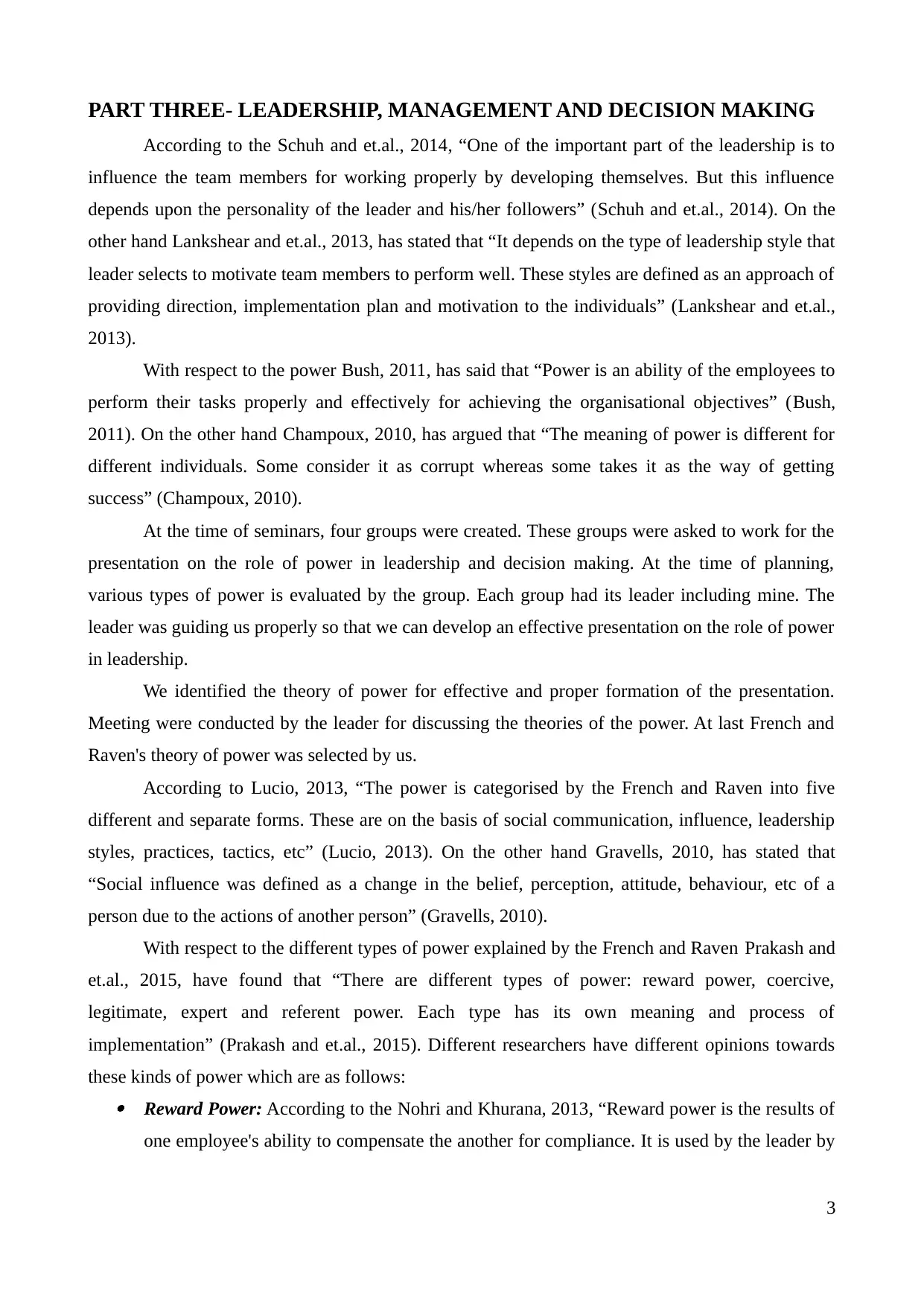
PART THREE- LEADERSHIP, MANAGEMENT AND DECISION MAKING
According to the Schuh and et.al., 2014, “One of the important part of the leadership is to
influence the team members for working properly by developing themselves. But this influence
depends upon the personality of the leader and his/her followers” (Schuh and et.al., 2014). On the
other hand Lankshear and et.al., 2013, has stated that “It depends on the type of leadership style that
leader selects to motivate team members to perform well. These styles are defined as an approach of
providing direction, implementation plan and motivation to the individuals” (Lankshear and et.al.,
2013).
With respect to the power Bush, 2011, has said that “Power is an ability of the employees to
perform their tasks properly and effectively for achieving the organisational objectives” (Bush,
2011). On the other hand Champoux, 2010, has argued that “The meaning of power is different for
different individuals. Some consider it as corrupt whereas some takes it as the way of getting
success” (Champoux, 2010).
At the time of seminars, four groups were created. These groups were asked to work for the
presentation on the role of power in leadership and decision making. At the time of planning,
various types of power is evaluated by the group. Each group had its leader including mine. The
leader was guiding us properly so that we can develop an effective presentation on the role of power
in leadership.
We identified the theory of power for effective and proper formation of the presentation.
Meeting were conducted by the leader for discussing the theories of the power. At last French and
Raven's theory of power was selected by us.
According to Lucio, 2013, “The power is categorised by the French and Raven into five
different and separate forms. These are on the basis of social communication, influence, leadership
styles, practices, tactics, etc” (Lucio, 2013). On the other hand Gravells, 2010, has stated that
“Social influence was defined as a change in the belief, perception, attitude, behaviour, etc of a
person due to the actions of another person” (Gravells, 2010).
With respect to the different types of power explained by the French and Raven Prakash and
et.al., 2015, have found that “There are different types of power: reward power, coercive,
legitimate, expert and referent power. Each type has its own meaning and process of
implementation” (Prakash and et.al., 2015). Different researchers have different opinions towards
these kinds of power which are as follows: Reward Power: According to the Nohri and Khurana, 2013, “Reward power is the results of
one employee's ability to compensate the another for compliance. It is used by the leader by
3
According to the Schuh and et.al., 2014, “One of the important part of the leadership is to
influence the team members for working properly by developing themselves. But this influence
depends upon the personality of the leader and his/her followers” (Schuh and et.al., 2014). On the
other hand Lankshear and et.al., 2013, has stated that “It depends on the type of leadership style that
leader selects to motivate team members to perform well. These styles are defined as an approach of
providing direction, implementation plan and motivation to the individuals” (Lankshear and et.al.,
2013).
With respect to the power Bush, 2011, has said that “Power is an ability of the employees to
perform their tasks properly and effectively for achieving the organisational objectives” (Bush,
2011). On the other hand Champoux, 2010, has argued that “The meaning of power is different for
different individuals. Some consider it as corrupt whereas some takes it as the way of getting
success” (Champoux, 2010).
At the time of seminars, four groups were created. These groups were asked to work for the
presentation on the role of power in leadership and decision making. At the time of planning,
various types of power is evaluated by the group. Each group had its leader including mine. The
leader was guiding us properly so that we can develop an effective presentation on the role of power
in leadership.
We identified the theory of power for effective and proper formation of the presentation.
Meeting were conducted by the leader for discussing the theories of the power. At last French and
Raven's theory of power was selected by us.
According to Lucio, 2013, “The power is categorised by the French and Raven into five
different and separate forms. These are on the basis of social communication, influence, leadership
styles, practices, tactics, etc” (Lucio, 2013). On the other hand Gravells, 2010, has stated that
“Social influence was defined as a change in the belief, perception, attitude, behaviour, etc of a
person due to the actions of another person” (Gravells, 2010).
With respect to the different types of power explained by the French and Raven Prakash and
et.al., 2015, have found that “There are different types of power: reward power, coercive,
legitimate, expert and referent power. Each type has its own meaning and process of
implementation” (Prakash and et.al., 2015). Different researchers have different opinions towards
these kinds of power which are as follows: Reward Power: According to the Nohri and Khurana, 2013, “Reward power is the results of
one employee's ability to compensate the another for compliance. It is used by the leader by
3
⊘ This is a preview!⊘
Do you want full access?
Subscribe today to unlock all pages.

Trusted by 1+ million students worldwide
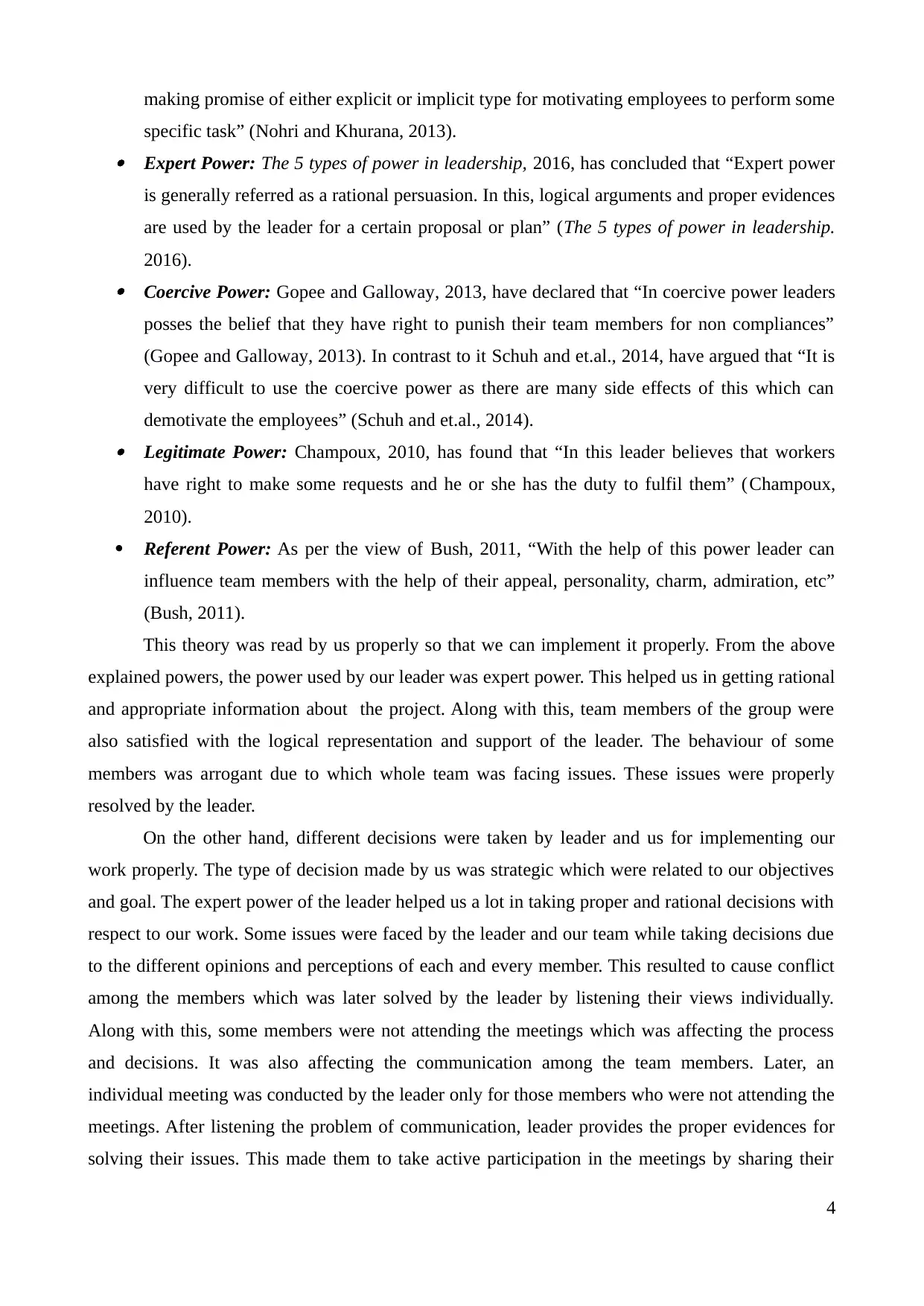
making promise of either explicit or implicit type for motivating employees to perform some
specific task” (Nohri and Khurana, 2013). Expert Power: The 5 types of power in leadership, 2016, has concluded that “Expert power
is generally referred as a rational persuasion. In this, logical arguments and proper evidences
are used by the leader for a certain proposal or plan” (The 5 types of power in leadership.
2016). Coercive Power: Gopee and Galloway, 2013, have declared that “In coercive power leaders
posses the belief that they have right to punish their team members for non compliances”
(Gopee and Galloway, 2013). In contrast to it Schuh and et.al., 2014, have argued that “It is
very difficult to use the coercive power as there are many side effects of this which can
demotivate the employees” (Schuh and et.al., 2014). Legitimate Power: Champoux, 2010, has found that “In this leader believes that workers
have right to make some requests and he or she has the duty to fulfil them” (Champoux,
2010).
Referent Power: As per the view of Bush, 2011, “With the help of this power leader can
influence team members with the help of their appeal, personality, charm, admiration, etc”
(Bush, 2011).
This theory was read by us properly so that we can implement it properly. From the above
explained powers, the power used by our leader was expert power. This helped us in getting rational
and appropriate information about the project. Along with this, team members of the group were
also satisfied with the logical representation and support of the leader. The behaviour of some
members was arrogant due to which whole team was facing issues. These issues were properly
resolved by the leader.
On the other hand, different decisions were taken by leader and us for implementing our
work properly. The type of decision made by us was strategic which were related to our objectives
and goal. The expert power of the leader helped us a lot in taking proper and rational decisions with
respect to our work. Some issues were faced by the leader and our team while taking decisions due
to the different opinions and perceptions of each and every member. This resulted to cause conflict
among the members which was later solved by the leader by listening their views individually.
Along with this, some members were not attending the meetings which was affecting the process
and decisions. It was also affecting the communication among the team members. Later, an
individual meeting was conducted by the leader only for those members who were not attending the
meetings. After listening the problem of communication, leader provides the proper evidences for
solving their issues. This made them to take active participation in the meetings by sharing their
4
specific task” (Nohri and Khurana, 2013). Expert Power: The 5 types of power in leadership, 2016, has concluded that “Expert power
is generally referred as a rational persuasion. In this, logical arguments and proper evidences
are used by the leader for a certain proposal or plan” (The 5 types of power in leadership.
2016). Coercive Power: Gopee and Galloway, 2013, have declared that “In coercive power leaders
posses the belief that they have right to punish their team members for non compliances”
(Gopee and Galloway, 2013). In contrast to it Schuh and et.al., 2014, have argued that “It is
very difficult to use the coercive power as there are many side effects of this which can
demotivate the employees” (Schuh and et.al., 2014). Legitimate Power: Champoux, 2010, has found that “In this leader believes that workers
have right to make some requests and he or she has the duty to fulfil them” (Champoux,
2010).
Referent Power: As per the view of Bush, 2011, “With the help of this power leader can
influence team members with the help of their appeal, personality, charm, admiration, etc”
(Bush, 2011).
This theory was read by us properly so that we can implement it properly. From the above
explained powers, the power used by our leader was expert power. This helped us in getting rational
and appropriate information about the project. Along with this, team members of the group were
also satisfied with the logical representation and support of the leader. The behaviour of some
members was arrogant due to which whole team was facing issues. These issues were properly
resolved by the leader.
On the other hand, different decisions were taken by leader and us for implementing our
work properly. The type of decision made by us was strategic which were related to our objectives
and goal. The expert power of the leader helped us a lot in taking proper and rational decisions with
respect to our work. Some issues were faced by the leader and our team while taking decisions due
to the different opinions and perceptions of each and every member. This resulted to cause conflict
among the members which was later solved by the leader by listening their views individually.
Along with this, some members were not attending the meetings which was affecting the process
and decisions. It was also affecting the communication among the team members. Later, an
individual meeting was conducted by the leader only for those members who were not attending the
meetings. After listening the problem of communication, leader provides the proper evidences for
solving their issues. This made them to take active participation in the meetings by sharing their
4
Paraphrase This Document
Need a fresh take? Get an instant paraphrase of this document with our AI Paraphraser
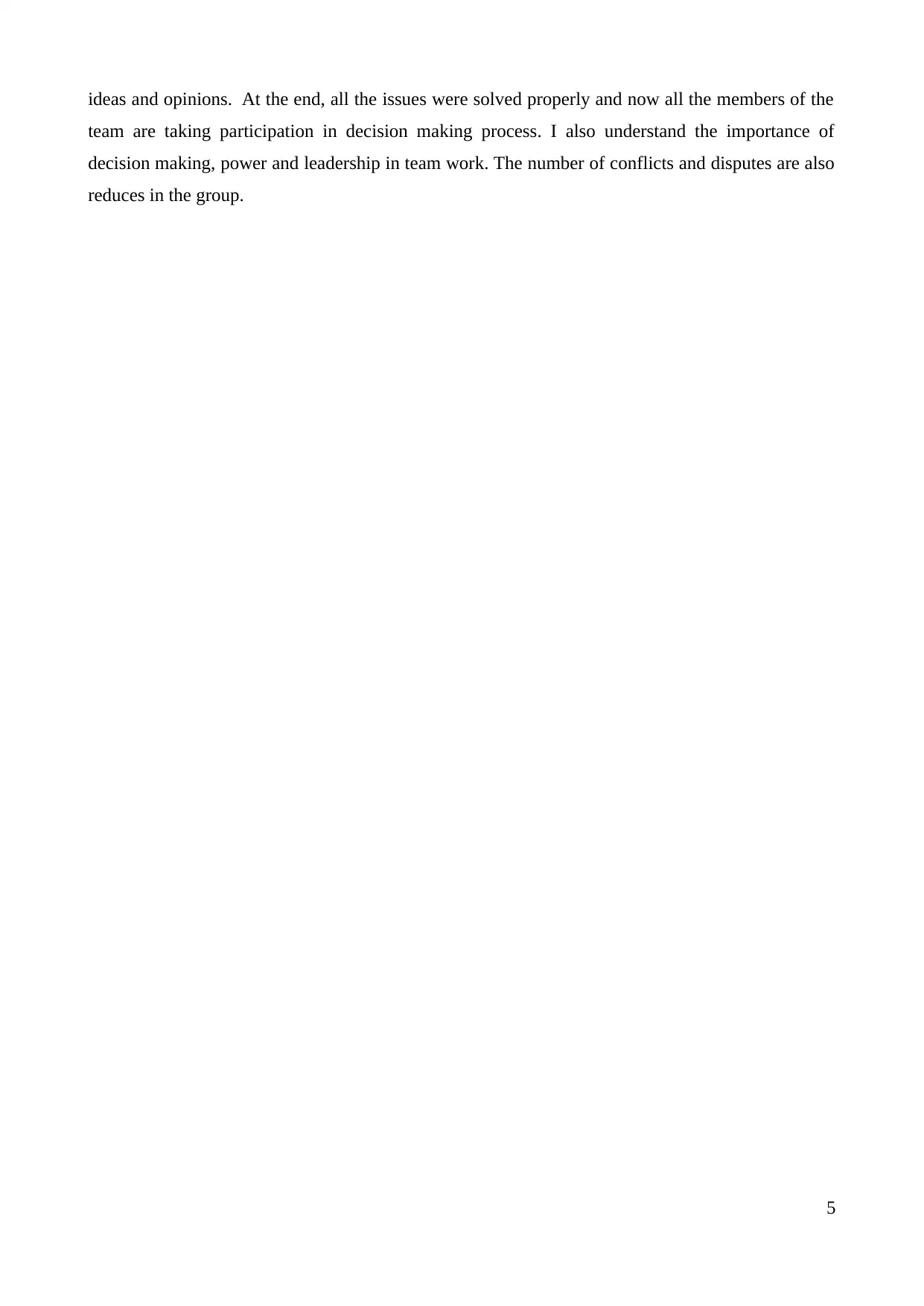
ideas and opinions. At the end, all the issues were solved properly and now all the members of the
team are taking participation in decision making process. I also understand the importance of
decision making, power and leadership in team work. The number of conflicts and disputes are also
reduces in the group.
5
team are taking participation in decision making process. I also understand the importance of
decision making, power and leadership in team work. The number of conflicts and disputes are also
reduces in the group.
5
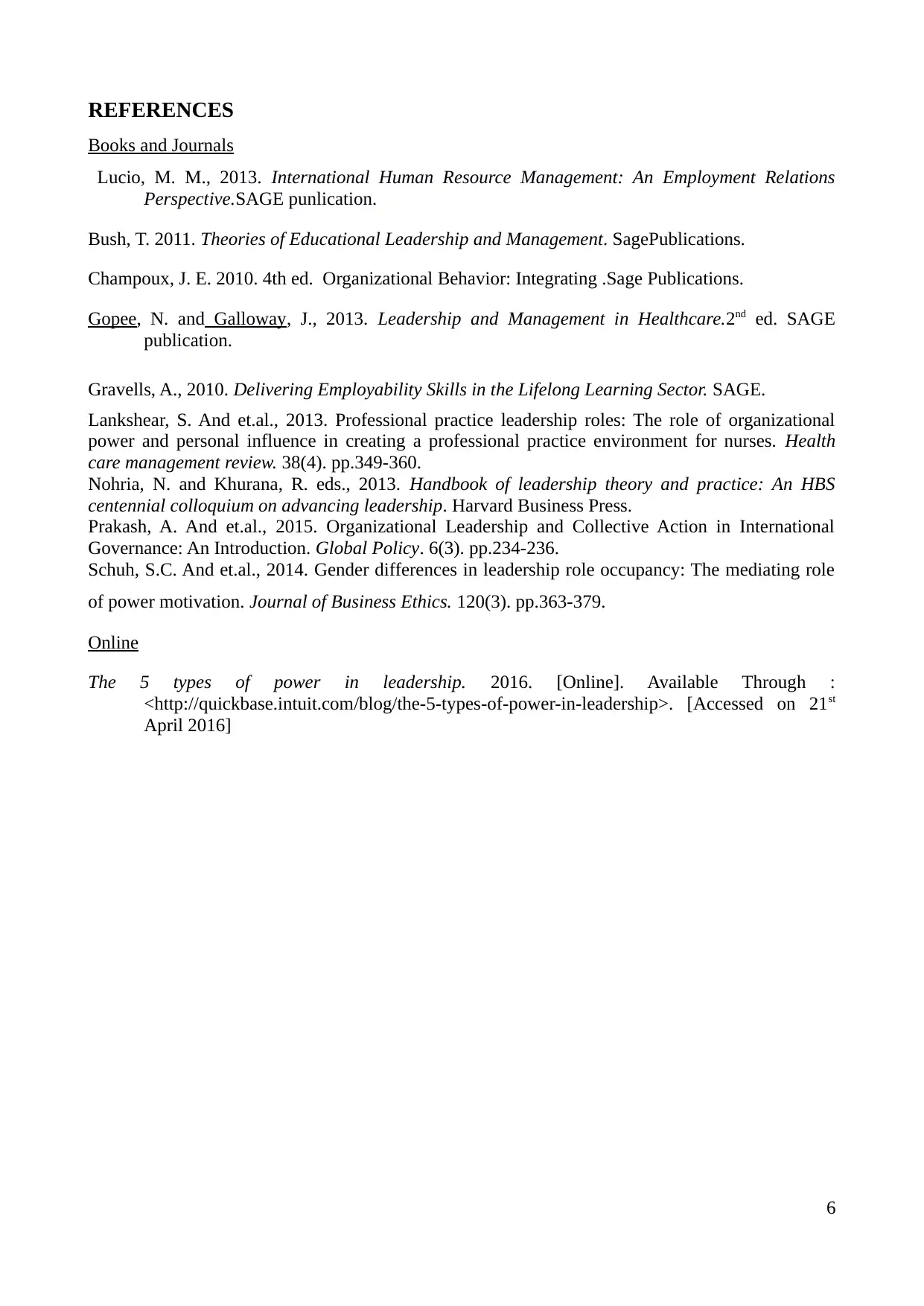
REFERENCES
Books and Journals
Lucio, M. M., 2013. International Human Resource Management: An Employment Relations
Perspective.SAGE punlication.
Bush, T. 2011. Theories of Educational Leadership and Management. SagePublications.
Champoux, J. E. 2010. 4th ed. Organizational Behavior: Integrating .Sage Publications.
Gopee, N. and Galloway, J., 2013. Leadership and Management in Healthcare.2nd ed. SAGE
publication.
Gravells, A., 2010. Delivering Employability Skills in the Lifelong Learning Sector. SAGE.
Lankshear, S. And et.al., 2013. Professional practice leadership roles: The role of organizational
power and personal influence in creating a professional practice environment for nurses. Health
care management review. 38(4). pp.349-360.
Nohria, N. and Khurana, R. eds., 2013. Handbook of leadership theory and practice: An HBS
centennial colloquium on advancing leadership. Harvard Business Press.
Prakash, A. And et.al., 2015. Organizational Leadership and Collective Action in International
Governance: An Introduction. Global Policy. 6(3). pp.234-236.
Schuh, S.C. And et.al., 2014. Gender differences in leadership role occupancy: The mediating role
of power motivation. Journal of Business Ethics. 120(3). pp.363-379.
Online
The 5 types of power in leadership. 2016. [Online]. Available Through :
<http://quickbase.intuit.com/blog/the-5-types-of-power-in-leadership>. [Accessed on 21st
April 2016]
6
Books and Journals
Lucio, M. M., 2013. International Human Resource Management: An Employment Relations
Perspective.SAGE punlication.
Bush, T. 2011. Theories of Educational Leadership and Management. SagePublications.
Champoux, J. E. 2010. 4th ed. Organizational Behavior: Integrating .Sage Publications.
Gopee, N. and Galloway, J., 2013. Leadership and Management in Healthcare.2nd ed. SAGE
publication.
Gravells, A., 2010. Delivering Employability Skills in the Lifelong Learning Sector. SAGE.
Lankshear, S. And et.al., 2013. Professional practice leadership roles: The role of organizational
power and personal influence in creating a professional practice environment for nurses. Health
care management review. 38(4). pp.349-360.
Nohria, N. and Khurana, R. eds., 2013. Handbook of leadership theory and practice: An HBS
centennial colloquium on advancing leadership. Harvard Business Press.
Prakash, A. And et.al., 2015. Organizational Leadership and Collective Action in International
Governance: An Introduction. Global Policy. 6(3). pp.234-236.
Schuh, S.C. And et.al., 2014. Gender differences in leadership role occupancy: The mediating role
of power motivation. Journal of Business Ethics. 120(3). pp.363-379.
Online
The 5 types of power in leadership. 2016. [Online]. Available Through :
<http://quickbase.intuit.com/blog/the-5-types-of-power-in-leadership>. [Accessed on 21st
April 2016]
6
⊘ This is a preview!⊘
Do you want full access?
Subscribe today to unlock all pages.

Trusted by 1+ million students worldwide
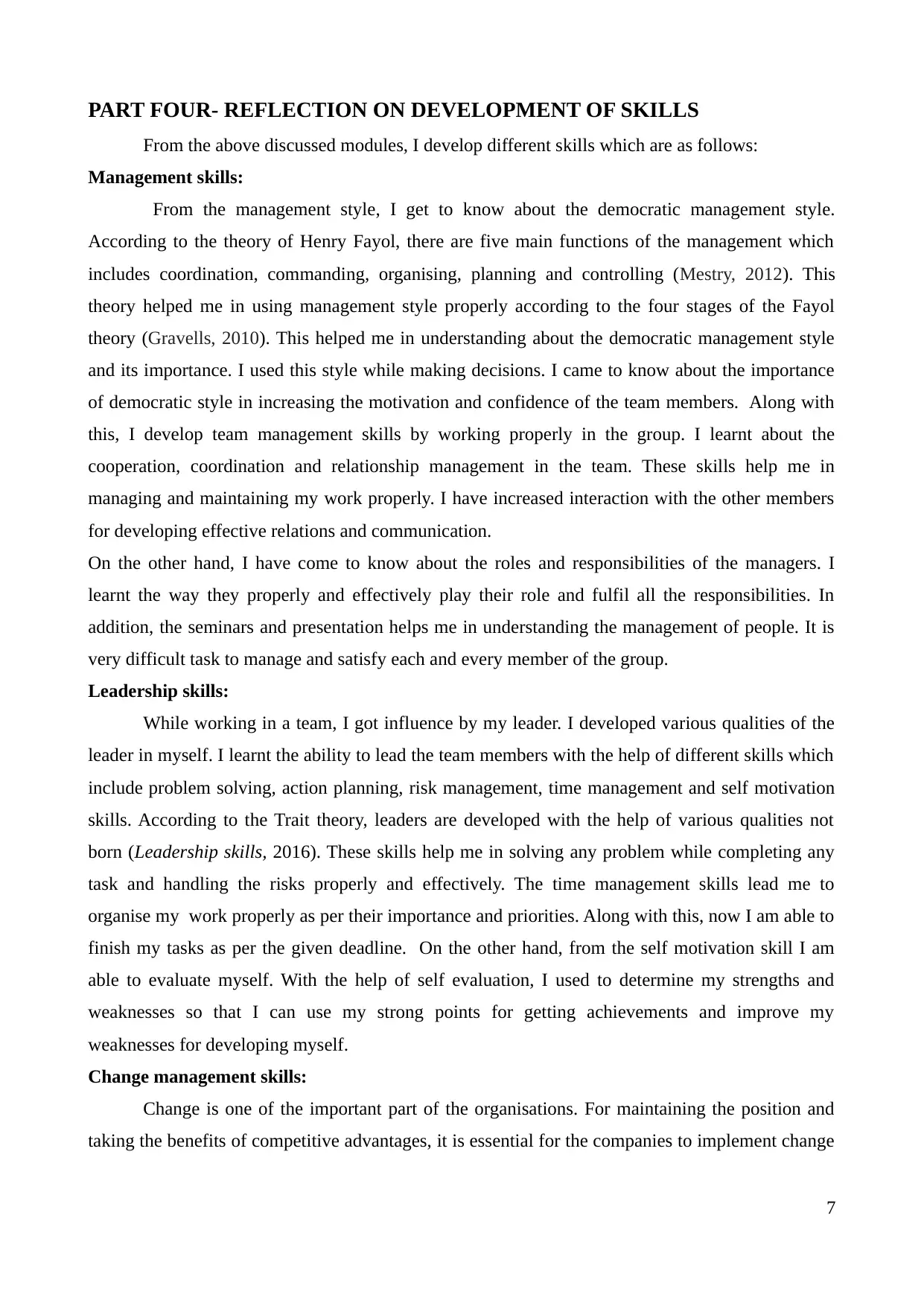
PART FOUR- REFLECTION ON DEVELOPMENT OF SKILLS
From the above discussed modules, I develop different skills which are as follows:
Management skills:
From the management style, I get to know about the democratic management style.
According to the theory of Henry Fayol, there are five main functions of the management which
includes coordination, commanding, organising, planning and controlling (Mestry, 2012). This
theory helped me in using management style properly according to the four stages of the Fayol
theory (Gravells, 2010). This helped me in understanding about the democratic management style
and its importance. I used this style while making decisions. I came to know about the importance
of democratic style in increasing the motivation and confidence of the team members. Along with
this, I develop team management skills by working properly in the group. I learnt about the
cooperation, coordination and relationship management in the team. These skills help me in
managing and maintaining my work properly. I have increased interaction with the other members
for developing effective relations and communication.
On the other hand, I have come to know about the roles and responsibilities of the managers. I
learnt the way they properly and effectively play their role and fulfil all the responsibilities. In
addition, the seminars and presentation helps me in understanding the management of people. It is
very difficult task to manage and satisfy each and every member of the group.
Leadership skills:
While working in a team, I got influence by my leader. I developed various qualities of the
leader in myself. I learnt the ability to lead the team members with the help of different skills which
include problem solving, action planning, risk management, time management and self motivation
skills. According to the Trait theory, leaders are developed with the help of various qualities not
born (Leadership skills, 2016). These skills help me in solving any problem while completing any
task and handling the risks properly and effectively. The time management skills lead me to
organise my work properly as per their importance and priorities. Along with this, now I am able to
finish my tasks as per the given deadline. On the other hand, from the self motivation skill I am
able to evaluate myself. With the help of self evaluation, I used to determine my strengths and
weaknesses so that I can use my strong points for getting achievements and improve my
weaknesses for developing myself.
Change management skills:
Change is one of the important part of the organisations. For maintaining the position and
taking the benefits of competitive advantages, it is essential for the companies to implement change
7
From the above discussed modules, I develop different skills which are as follows:
Management skills:
From the management style, I get to know about the democratic management style.
According to the theory of Henry Fayol, there are five main functions of the management which
includes coordination, commanding, organising, planning and controlling (Mestry, 2012). This
theory helped me in using management style properly according to the four stages of the Fayol
theory (Gravells, 2010). This helped me in understanding about the democratic management style
and its importance. I used this style while making decisions. I came to know about the importance
of democratic style in increasing the motivation and confidence of the team members. Along with
this, I develop team management skills by working properly in the group. I learnt about the
cooperation, coordination and relationship management in the team. These skills help me in
managing and maintaining my work properly. I have increased interaction with the other members
for developing effective relations and communication.
On the other hand, I have come to know about the roles and responsibilities of the managers. I
learnt the way they properly and effectively play their role and fulfil all the responsibilities. In
addition, the seminars and presentation helps me in understanding the management of people. It is
very difficult task to manage and satisfy each and every member of the group.
Leadership skills:
While working in a team, I got influence by my leader. I developed various qualities of the
leader in myself. I learnt the ability to lead the team members with the help of different skills which
include problem solving, action planning, risk management, time management and self motivation
skills. According to the Trait theory, leaders are developed with the help of various qualities not
born (Leadership skills, 2016). These skills help me in solving any problem while completing any
task and handling the risks properly and effectively. The time management skills lead me to
organise my work properly as per their importance and priorities. Along with this, now I am able to
finish my tasks as per the given deadline. On the other hand, from the self motivation skill I am
able to evaluate myself. With the help of self evaluation, I used to determine my strengths and
weaknesses so that I can use my strong points for getting achievements and improve my
weaknesses for developing myself.
Change management skills:
Change is one of the important part of the organisations. For maintaining the position and
taking the benefits of competitive advantages, it is essential for the companies to implement change
7
Paraphrase This Document
Need a fresh take? Get an instant paraphrase of this document with our AI Paraphraser

in their working environment. Along with this, change is also important for the personal growth and
development. It is necessary for the individual to keep himself updated as per the market trends and
environment. I used to resist the change due to the fear of losing my identity. But while working on
the change management, I came to know about its importance and necessity in life. During the
group work for handling the issue of communication, we started using WhatsApp which was a
change in our team. Firstly it was difficult for me toe accept the change but later I adopt it and
started using it. This change helped me in developing change management skills. According to the
Lewin's change management theory, there are three steps of accepting the change which includes
Unfreeze, change and refreeze (Lucio, 2013.). With the help of this theory, employees of an
enterprise can adopt the change without losing time and resources.
Ethical decision making skills:
In this year, I took decision for following the ethical leadership style while guiding the
employees for accomplishment of the objectives. This style helped me in taking ethical decisions
without any biassness. This helped me in creating ethical and valuable cultural environment of the
company. This decision of using ethical leadership skills was appropriate and effective as per the
ethics of the other workers (Zepeda, 2011). This lead me to put aside my ego and personal interest
while taking decisions for the growth and development of the company and its employees.
According to the Utilitarianism theory of ethics, a person has ability to predict the results of an
action. The acts performed by the particular individual provides benefit to the other people. As per
this theory, my decision of using ethical leadership has motivated and increased the morale of my
team members. On the other hand, the virtue ethical theory judges the individual on the basis of
his/her character and nature instead of the actions (Xiao, Tang and Wirtz, 2011). While evaluating
the ethics and morale of the employee, this theory takes their reputation, behaviour and motivation
into the consideration. So it it is essential to improve the behaviour with the actions.
8
development. It is necessary for the individual to keep himself updated as per the market trends and
environment. I used to resist the change due to the fear of losing my identity. But while working on
the change management, I came to know about its importance and necessity in life. During the
group work for handling the issue of communication, we started using WhatsApp which was a
change in our team. Firstly it was difficult for me toe accept the change but later I adopt it and
started using it. This change helped me in developing change management skills. According to the
Lewin's change management theory, there are three steps of accepting the change which includes
Unfreeze, change and refreeze (Lucio, 2013.). With the help of this theory, employees of an
enterprise can adopt the change without losing time and resources.
Ethical decision making skills:
In this year, I took decision for following the ethical leadership style while guiding the
employees for accomplishment of the objectives. This style helped me in taking ethical decisions
without any biassness. This helped me in creating ethical and valuable cultural environment of the
company. This decision of using ethical leadership skills was appropriate and effective as per the
ethics of the other workers (Zepeda, 2011). This lead me to put aside my ego and personal interest
while taking decisions for the growth and development of the company and its employees.
According to the Utilitarianism theory of ethics, a person has ability to predict the results of an
action. The acts performed by the particular individual provides benefit to the other people. As per
this theory, my decision of using ethical leadership has motivated and increased the morale of my
team members. On the other hand, the virtue ethical theory judges the individual on the basis of
his/her character and nature instead of the actions (Xiao, Tang and Wirtz, 2011). While evaluating
the ethics and morale of the employee, this theory takes their reputation, behaviour and motivation
into the consideration. So it it is essential to improve the behaviour with the actions.
8

REFERENCES
Books and Journals
Zepeda, J. S., 2011. Professional Development: What Works. 2nd ed. Eye On Education.
Lucio, M. M., 2013. International Human Resource Management: An Employment Relations
Perspective.SAGE publication
Mestry, R., 2012. The training and development of principals in the management of
educators. (Doctoral dissertation).
Gravells, A., 2010. Delivering Employability Skills in the Lifelong Learning Sector. SAGE.
Xiao, P., Tang, C. S. and Wirtz, J., 2011. Optimizing referral reward programs under impression
management considerations. European Journal of Operational Research. 215(3). pp.730-
739.
Online
Leadership skills. 2016. [Online]. Available Through : <http://www.skillsyouneed.com/leadership-
skills.html>. [Accessed on 21st April 2016]
9
Books and Journals
Zepeda, J. S., 2011. Professional Development: What Works. 2nd ed. Eye On Education.
Lucio, M. M., 2013. International Human Resource Management: An Employment Relations
Perspective.SAGE publication
Mestry, R., 2012. The training and development of principals in the management of
educators. (Doctoral dissertation).
Gravells, A., 2010. Delivering Employability Skills in the Lifelong Learning Sector. SAGE.
Xiao, P., Tang, C. S. and Wirtz, J., 2011. Optimizing referral reward programs under impression
management considerations. European Journal of Operational Research. 215(3). pp.730-
739.
Online
Leadership skills. 2016. [Online]. Available Through : <http://www.skillsyouneed.com/leadership-
skills.html>. [Accessed on 21st April 2016]
9
⊘ This is a preview!⊘
Do you want full access?
Subscribe today to unlock all pages.

Trusted by 1+ million students worldwide
1 out of 9
Your All-in-One AI-Powered Toolkit for Academic Success.
+13062052269
info@desklib.com
Available 24*7 on WhatsApp / Email
![[object Object]](/_next/static/media/star-bottom.7253800d.svg)
Unlock your academic potential
Copyright © 2020–2026 A2Z Services. All Rights Reserved. Developed and managed by ZUCOL.


